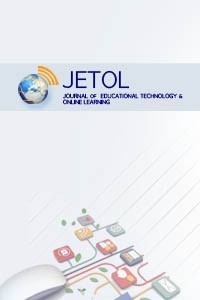Teaching and Learning in resource-limited settings in the face of the COVID-19 pandemic
Teaching and Learning in resource-limited settings in the face of the COVID-19 pandemic
Copperbelt, online learning, COVID-19, e-learning Copperbelt University,
___
- Arkorful, V., & Abaidoo, N. (2015). The role of e-learning, advantages and disadvantages of its adoption in higher education. International Journal of Instructional Technology and Distance Learning.
- Asongu, S., le Roux, S., Nwachukwu, J. C., & Pyke, C. (2019). The mobile phone as an argument for good governance in sub-Saharan Africa. Information Technology and People. https://doi.org/10.1108/ITP-01-2018-0011
- Chen, N., Zhou, M., Dong, X., Qu, J., Gong, F., Han, Y., … Zhang, L. (2020). Epidemiological and clinical characteristics of 99 cases of 2019 novel coronavirus pneumonia in Wuhan, China: a descriptive study. The Lancet. https://doi.org/10.1016/S0140-6736(20)30211-7
- Croizet, J. C., Goudeau, S., Marot, M., & Millet, M. (2017). How do educational contexts contribute to the social class achievement gap: documenting symbolic violence from a social psychological point of view. Current Opinion in Psychology. https://doi.org/10.1016/j.copsyc.2017.08.025
- Dick, W. (1996). The Dick and Carey model: Will it survive the decade? Educational Technology Research and Development. https://doi.org/10.1007/BF02300425
- Donou-Adonsou, F. (2019). Technology, education, and economic growth in Sub-Saharan Africa. Telecommunications Policy. https://doi.org/10.1016/j.telpol.2018.08.005
- Espenshade, T. J., & Radford, A. W. (2009). No longer separate, not yet equal: Race and class in elite college admission and campus life. No Longer Separate, Not Yet Equal: Race and Class in Elite College Admission and Campus Life.
- Gunga, S. O., & Ricketts, I. W. (2007). Facing the challenges of e-learning initiatives in African universities. In British Journal of Educational Technology. https://doi.org/10.1111/j.1467-8535.2006.00677.x
- Honey, P. (2001). E-learning: A performance appraisal and some suggestions for improvement. The Learning Organization. https://doi.org/10.1108/EUM0000000005913 Jackson, T. (2016). The dawn of an African e-commerce goldrush may be a false one.
- UNESCO. (2020). COVID-19 Educational Disruption and Response. Unesco.Org.
- World Health Organization. (2020). Naming the coronavirus disease (COVID-19) and the virus that causes it. World Health Organization.
- ISSN: 2618-6586
- Yayın Aralığı: Yılda 3 Sayı
- Başlangıç: 2017
- Yayıncı: Gürhan DURAK
Predicting Academic Achievement with Machine Learning Algorithms
Muhammed YILDIZ, Caner BÖREKCİ
The Use of Mobile-Based Augmented Reality in Science Learning to Improve Learning Motivation
Online Teaching Experiences of ELT Instructors
Burcu ŞENER, İnci SAĞLAM ERTEM, Ahmet MEÇ
Online Learning in Higher Education during COVID-19 Pandemic: A case of Ghana
Edmond Kwesi AGORMEDAH, Eugene ADU HENAKU, Desire Mawuko Komla AYİTE, Enoch APORİ ANSAH
Teacher candidate perceptions on alternative asynchronous online discussion boards
Putri PUTRİ, Hermınarto SOFYAN
A Blueprint for In-Service Teacher Training Program in Technology Integration
Teaching and Learning in resource-limited settings in the face of the COVID-19 pandemic
Role of emerging technology on academic achievement of students at the University of Cape Coast
